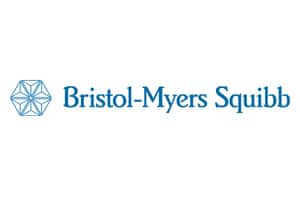
Bristol-Myers Squibb posted a 10% increase in revenues in the second quarter, but reporting focused on mixed results in a trial of its main growth driver Opdivo in lung cancer.
BMS has been desperate to come up with an Opdivo (nivolumab) study that can expand use of the drug into first-line non-small cell lung cancer (NSCLC), a category comprehensively dominated by Merck & Co/MSD’s rival Keytruda (pembrolizumab).
The new CheckMate-227 trial reported on the eve of the BMS results met one of its primary endpoints, with a low-dose combination of Opdivo plus BMS’ other immunotherapy Yervoy (ipilimumab) showing superiority to chemotherapy in patients whose tumours expressed 1% or more of the biomarker PD-L1.
Unfortunately for BMS, in a second part of the study Opdivo plus chemotherapy failed to outperform chemotherapy alone in non-squamous NSCLC, although there was a trend towards improved survival.
That is a surprising outcome given that Keytruda plus chemo was a clear winner over chemo alone in phase 3 testing, a result that has driven its use in the first-line setting, and BMS suggested the chemo group “overperformed” while Opdivo’s activity was as expected.
BMS said that the first result meant Opdivo plus Yervoy could provide a chemotherapy, and potentially side effect sparing, option for previously-untreated NSCLC patients, particularly as there were also preliminary signs from the data that the combination might benefit PD-L1-negative patients.
The jury is however out on whether patients and payers will plump for that option over Keytruda monotherapy, which is another approved first-line option for PD-L1-positive patients.
BMS’ chief executive Giovanni Caforio gave an upbeat assessment on the company’s second-quarter results call, saying he was “excited about the potential opportunity to offer a differentiated option for patients” and would be discussing the results with regulators “as soon as possible.”
“We continue to expect growth for Opdivo in the US and ex-US this year compared to last year,” he added.
The cancer immunotherapy contributed $1.82bn to BMS’ $6.3bn in second-quarter revenues, a 12% increase which represents a slowdown in terms of its historical growth rates. Older cardiovascular drug Eliquis (apixaban) led the charge this quarter with a 24% increase to $2.04bn, while Yervoy also put in a good showing with a 37% hike to $367m.
Opdivo’s loss of momentum – plus greater pressure in the US on pricing – are among the reasons behind BMS’ $74bn acquisition of Celgene that will give it a more diversified portfolio of marketed products and a stronger near-term pipeline.
On BMS’ results call, Caforio said that “significant interest” had been received from potential buyers of Otezla (apremilast), a psoriasis therapy that has to be divested to get the deal through antitrust, and he reiterated the intention to complete the acquisition “late this year or early next year.”




